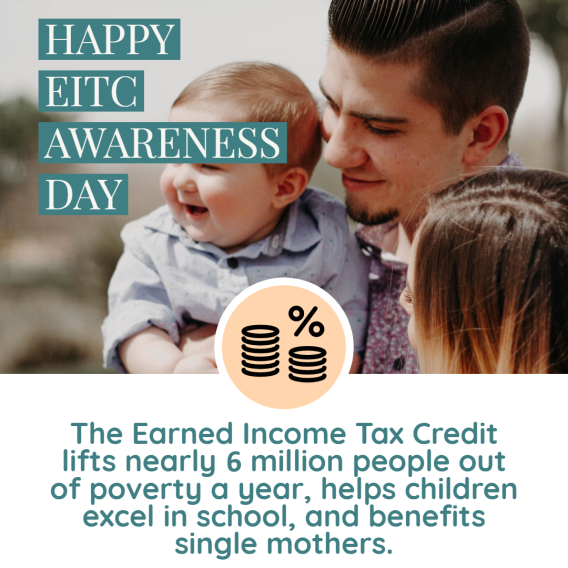By Christine Tran, 2021 Get It Back Campaign Intern
A guide for divorced, unmarried, separated, and non-custodial parents and guardians on all things Child Tax Credit and advance payments.
Only one person — whoever lives with the child for more than half the year in 2021 — can claim the Child Tax Credit (CTC) and get advance payments. The CTC cannot be split or shared, even if you have joint custody of your child.
You will get half of the credit through advance payments. You will receive the rest of the CTC when you file a 2021 tax return in 2022.
If you and another parent or guardian lived with your child for more than half of the year, whoever claimed the child on the 2020 tax return (or 2019, if the 2020 tax return hasn’t been filed and processed) will receive the advance payments. The same rule applies for any relatives who can claim the child.
The parent who receives the advance payments should also claim the CTC on their 2021 tax return (which you file in 2022), to receive the remainder of the credit. If the other parent claims the CTC, the IRS will question whether they issued improper advance payments. The IRS may need to take additional steps to determine who can rightfully claim the child, which may delay your tax refund.
Here are some scenarios that divorced, unmarried, separated, or non-custodial parents may encounter and options to resolve them. This information does not constitute legal or tax advice. Please seek a lawyer or tax professional for professional guidance.
1. I am receiving the Child Tax Credit advanced payments, but my child does not live with me in 2021. What do I do?
If you claimed your child on a 2019 or 2020 tax return, the IRS may have automatically issued you advance CTC payments.
- Use the Child Tax Credit Update Portal (CTC UP) to opt-out of advance payments. Your future advance payments will be stopped. If you are receiving payments for multiple children, later this year, you will be able to remove a child from your Child Tax Credit information and continue to get payments for other children in your household.
- If you haven’t filed a 2020 tax return, you can do so to provide the IRS with more current information about your family situation. Your future advance payments will be stopped after your 2020 return is processed. Note that the IRS still has a backlog of tax returns to process, so you may experience delays. If you choose this option, your advance payments will not be stopped until the IRS has processed your 2020 tax return. Using CTC UP to opt-out may be a better option to stop your advance payments sooner. You can use CTC UP and still file your 2020 tax return, which may be worth the potential wait if you’re eligible for other tax credits (federal or state).
- Continue receiving CTC advance payments if your child’s other parent agrees to allow you to claim your child on your 2021 tax return (which you file in 2022). They will need to sign and give you Form 8332, Release/Revocation of Release of Claim to Exemption for Child by Custodial Parent. You will attach Form 8332 to your 2021 tax return to claim the other half of the CTC.
If the IRS issues advance CTC payments to you that you aren’t eligible for, you might have to pay the IRS back. Congress enacted repayment protection for families with lower incomes. If your 2021 income is less than $40,000 ($60,000 for married couples and $50,000 for heads of households), you will not be required to repay anything back. To learn more about repayment protection, see Question 25 in What’s New about the Child Tax Credit in 2021.
2. The wrong (non-custodial) parent claimed our child and is getting the Child Tax Credit advance payments without my permission. What can I do to get the payments?
This can be a complex tax matter. If the non-custodial parent has not filed 2020 taxes and is not planning on claiming the child for 2020, you can file a 2020 tax return or go to www.getctc.org to get the payments.
If the non-custodial parent is getting the advance payments based on filing their 2020 taxes, the situation is more complicated. One of the scenarios below may match your situation and give you more options.
Scenarios A:
- My ex-spouse claimed our child for the Child Tax Credit without my permission. The child lives with me for more than half of the year. My ex-spouse is now receiving the CTC advance payments.
- I am divorced. I claimed my child for the Child Tax Credit, but my 2020 tax return was rejected because my ex-spouse claimed our child first. My ex-spouse is now getting the CTC advance payments even though my child lives with me.
- I am unmarried and my child lives with me for most of the year. My co-parent and I take turns claiming our child on our taxes and 2020 was my year. My co-parent filed taxes before me and decided to claim our child on their 2020 tax return because they wanted the CTC advance payments.
If you have a cordial relationship with the person who claimed the child, you may want to have a conversation first to see if you can reach an agreement for you to receive the money. This may involve the other person filing an amended return, opting out of advance payments through CTC UP, or arranging to give the advance payments and the CTC at tax time to you.
If you cannot reach an agreement, or are unable to speak with the person, consider the options below. If you haven’t filed a 2020 tax return, you may want to do so by mail to claim your child and provide the IRS with more current information about your family situation.
While filing a 2020 tax return electronically is quicker, if somebody has already claimed your child, the electronic return will be rejected. Filing a 2020 tax return by mail will trigger the IRS to investigate who can rightfully claim your child by applying tiebreaker rules. The IRS will send a letter to you and the other parent or guardian to determine who can claim your child. They may request documentation to verify who the child lives with most.
It may take several months for the IRS to determine who can claim your child, so you might not receive the CTC advance payments. If this happens and the IRS finds you eligible for the CTC, you can get the full CTC when you file your tax return in 2022 for tax year 2021. You will be able to claim the full amount of the CTC even if your child’s other parent is currently receiving advance CTC payments. The decision of your child’s other parent to receive CTC advance payments (even though they may not be entitled to), will not affect your ability to claim the full CTC in 2022. Plan to file your 2021 tax return as soon as possible next year.
Scenarios B:
- I was married and filed a joint return for 2020 with my spouse, but we are now separated. I moved out and our child has lived with me most of this year. My spouse is receiving the Child Tax Credit advance payments and will not share them.
- I am a survivor of domestic violence and my children and I no longer live with my abusive spouse. However, my ex-spouse and I filed a joint return for 2020 and my ex is getting the Child Tax Credit advance payments. I cannot have contact with my ex-spouse.
The IRS bases the CTC advance payments on 2019 or 2020 (whichever is most recent) tax return information. If the IRS is sending CTC advance payments to a bank account or mailing address that you no longer have access to that is connected with your ex-spouse, unfortunately, you may not be able to resolve this issue so you can get the CTC advance payments. You may have to wait until you file your 2021 tax return (which you file in 2022) to claim the full amount of the CTC.
You will be able to claim the full amount of the CTC on your 2021 tax return (which you file in 2022), even if your ex-spouse is currently receiving advance CTC payments. Your ex-spouse’s decision to receive CTC advance payments (even though they may not be entitled to), will not affect your ability to claim the full CTC in 2022. The IRS may have to take additional steps once you file your 2021 tax return, to determine who can rightfully claim your child for the CTC. Plan to file your 2021 tax return as soon as possible next year. If your ex-spouse claims your children before you on their 2021 tax return, your electronic return will be rejected. You will have to file your 2020 tax return by mail to claim your children and this will trigger an IRS investigation to determine who can rightfully claim the children.
In the meantime, you can also request a payment trace to track your payment and document that your payment is going to a bank account or mailing address you no longer have access to.
To start a payment trace you can mail or fax Form 3911 to the IRS or call 800-829-1954. You can request a payment trace after:
- 5 days, if the payment is sent by direct deposit
- 4 weeks, if the payment was mailed by check to a standard address
- 6 weeks, if the payment was mailed to a forwarded address on file with the local post office
- 9 weeks after the payment was mailed to a foreign address
It can take up to 60 days to receive a response from the IRS.
It is helpful to document everything you are doing as proof that you aren’t receiving your CTC advance payments. Your payment trace can show that the advance payments went to the wrong parent or guardian. Document everything in addition to contacting a tax professional or tax clinic for specific guidance for your situation.
Click here for more information about the IRS payment trace process.
Later in the year, the IRS will add a new feature to the CTC UP that allows you to update your marital status and make changes to the children who are living with you that can be claimed for the CTC. Details about how this feature will work are unknown, including how the IRS will resolve a situation where a child has already been claimed for the CTC. We will update this page as more information becomes available if this is an option that can be useful for the described scenarios.
If applicable, you may want to consult the attorney who handled your divorce. You can also contact a Low-Income Taxpayer Clinic (LITC) or Community Legal Aid organization for legal help. LITCs and Community Legal Aid organizations can provide free or low-cost legal help for people with tax-related issues.
For survivors of domestic violence, click here for more information about address confidentiality programs and eligibility for special tax relief.
3. My ex-spouse and I have joint custody of our child and alternate tax years to claim my child. My ex-spouse claimed my child on the 2020 tax return and is now getting the CTC advance payments. However, my child lives with me in 2021 and I will be claiming my child on the 2021 tax return. Who should the CTC advance payments go to?
The CTC advance payments should go to the parent who lives with the child for more than half the year in 2021. In this case, the CTC advance payments should go to you, and you should claim the remaining half of the CTC when you file your 2021 tax return in 2022.
If you have a cordial relationship with your ex, you can let them know that they should opt out of the payments using CTC UP since it is your turn to claim your child for 2021. Your ex-spouse is not eligible to receive the CTC advance payments and the IRS could require your ex-spouse to pay them back. Your ex-spouse may be eligible for repayment protection if their income for 2021 is less than $40,000. Learn more about repayment protection (see Question 25).
Later in the year, the IRS is adding a new feature in CTC UP that will allow you to indicate that your child lives with you for most of 2021. After you update your Child Tax Credit information, you may start receiving the CTC advance payments. Details about how this feature will work are unknown, including how the IRS will resolve a situation where a child has already been claimed for the CTC. We will update this page as more information becomes available.
If you are unable to get the CTC advance payments, you can claim the full amount of the Child Tax Credit when you file your 2021 tax return (which you file in 2022). You can get the full CTC amount even if your ex-spouse is getting the advance payments currently. While your ex-spouse should opt out from receiving advance payments, their decision to do so does not affect your ability to claim the CTC.
You may want to consult the attorney who handled your divorce in case there are other issues to consider.
4. My spouse and I divorced. As part of the settlement, in exchange for child support, I agreed to allow them to claim our child as a dependent even though my child lives with me. I signed a waiver (Form 8332) allowing my ex-spouse to do this. However, the child support payments are small and infrequent, and my ex-spouse is now receiving the Child Tax Credit advance payments, which are more money.
You should consult the attorney who handled your divorce. If the waiver you signed was for more than 2020, you may revoke it for 2021 using the same waiver form (Form 8332, Release/Revocation of Release of Claim to Exemption for Child by Custodial Parent) when filing your return next year, providing a copy to your ex-spouse. By doing this, you can claim the CTC when filing your return next year.
Since the agreement may be part of the divorce settlement and there are larger issues of support, discuss with your attorney. Filing your claim next year may result in the IRS requiring your ex-spouse to repay the CTC advance payments they received in 2021, since your ex-spouse would no longer be eligible after you revoke the waiver for 2021. Your ex-spouse may be eligible for repayment protection if their income for 2021 is less than $40,000. Learn more about repayment protection (see Question 25).
5. I am a non-custodial parent. Can I get the Child Tax Credit advance payments?
If your child doesn’t live with you for most of the year, you are considered a non-custodial parent. You can get the CTC advance payments if the custodial parent agrees to let you get the Child Tax Credit and signs a waiver form (Form 8332, Release/Revocation of Release of Claim to Exemption for Child by Custodial Parent) that you must submit with your tax return. If you don’t have permission, you should opt out of payments. See question 1 (above) for how to opt out or get permission from the custodial parent to claim the child.
Resources
Law Help: Locate free or low-cost legal aid in your area. Select your state then find information about your legal rights by topic, such as family, divorce, and children.
Women’s Law: Search by state to identify domestic violence advocates, shelters, legal assistance organizations, courthouse locations to file a protection order, and sheriff departments.
Community Legal Aid: Search for local legal aid services that can provide free or low-cost legal help with tax issues.
Child Tax Credit FAQs: Learn more about the Child Tax Credit and advance payments by visiting What’s New about the Child Tax Credit in 2021?
Child Tax Credit Update Portal Guide: Use this guide for step-by-step instructions (with screenshots) on how to sign-up for and use CTC UP to make changes to your CTC information (marital status, number of children, bank account information, and mailing address) or opt-out of CTC advance payments.
GetCTC.org: If you’re not required to file taxes, visit this website to submit your information to the IRS to get your Child Tax Credit advance payments with the help of IRS certified volunteers. It is also available in Spanish.






